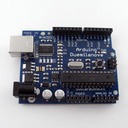SIGINT09 - final8
SIGINT 2009
22. - 24. Mai, Köln
| Speakers | |
|---|---|
|
|
Philip Steffan |
| Schedule | |
|---|---|
| Day | Pranks, Bugs, and Insecurities - 2009-05-23 |
| Room | Workshop (MP7) |
| Start time | 12:00 |
| Duration | 02:00 |
| Info | |
| ID | 3199 |
| Event type | Workshop |
| Language used for presentation | German |
| Feedback | |
|---|---|
|
Did you attend this event? Give Feedback |
Bau dein eigenes Gerät (1)
Eine Einführung in Arduino, die Open-Source-Elektronik-Umgebung

Elektronik und Programmierung für alle: Arduino heißt der Open-Source-Mini-Computer, der gerne Herz und Hirn aller Dinge ist, die dir einfallen. Er kann deine Roboter steuern, Licht und Sensoren in deiner Kleidung schalten und hilft deinen Pflanzen beim twittern.
Die Arduino-Hardware (eine handtellergroße Platine), ein USB-Kabel und dein Computer ist alles, was du zum Programmieren brauchst: Nutze die Open-Source-Arduino-Entwicklungsumgebung (IDE), die es für Linux, OS X und Windows gibt, um Programme ("Sketches" genannt) zu schreiben. Die Arduino-Sprache sollte jedem bekannt vorkommen, der schon einmal ein wenig C oder Java gesehen hat und ist für Anfänger sehr leicht zu erlernen.
Klicke auf "Upload" und dein Programm wird in den Arduino überspielt und startet dort sofort. Es wir keine teure Hardware benötigt, nur das Arduino-Board für 25 Euro - oder noch weniger, wenn du es selbst baust (nicht vergessen, die Hardware ist auch Open Source).
Schließe Sensoren und Aktoren an die programmierbaren Eingänge des Arduinos an: Lichtsensoren, Hitzesensoren, Schiebe- und Drehregler, Lautsprecher, Leuchtdioden, Motoren. Sende Daten über USB, Netzwerk oder drahtlos.
Benutze den Arduino als eigenständigen Mini-Computer mit Strom aus Batterien (oder einem Netzteil) oder setze ihn als universellen Eingangsadapter an deinem Computer ein um Spiele, Animationen und Kunstinstallationen zu steuern.
Der Arduino-Workshop liefert einen Überblick darüber, wie du auch ohne vorherige Erfahrung direkt in die Arbeit mit dem Arduino einsteigen kannst. Es werden viele Beispiele aus der Praxis und wie andere die Elektronik einsetzen gezeigt. Über das erste einfache Blinken (oder Knacken) gelangst du zum Prototyp deines ersten Geräts mit Steckplatine und elektronischen Bauteilen. Lötkenntnisse sind nicht nötig (aber wenn du es lernen willst, ist es auch kein Problem.)
Die Teilnehmer werden geben, sich im Vorfeld des Workshops anzumelden, damit genügend Arduino-Hardware verfügbar ist. Alle nötigen Teile (Arduino-Boards und elektronische Bauteile) können während des Workshops auf Wunsch auch gekauft werden, aber jeder ist auch dazu eingeladen, seine eigene Ausrüstung mitzubringen oder nur zuzuschauen.
(Text in English:)
Build your own thing
Introduction to Arduino, an open source electronic environment
Electronics and Programming is for everyone: Meet Arduino, the open source mini computer that loves to be the heart and brain of everything you can think of. It controls your robots, adds lights and sensors to your clothes and helps your house plants use twitter.
The Arduino hardware (a palm-sized PCB), a USB cable and your computer is all you need to program: Use the Open Source Arduino IDE (integrated development environment), available for Linux, OS X and Windows, to write programs, or "sketches" in the Arduino language, instantly familiar to anyone who has ever seen a hint of C or Java and very easy to learn for beginners.
Click on "upload" and your program is transferred to the Arduino and starts up immediately. No expensive hardware required, just an Arduino board for 25 Euros - or even cheaper, if you build it yourself (remember, the hardware is open source as well).
Connect sensors and actors to the programmable inputs of the Arduino board: Light sensors, heat sensors, sliders and pots, loudspeakers, LEDs, motors. Send data over USB, LAN or wirelessly.
Run the Arduino as a self contained mini computer powered by batteries (or a wall wart) or use it as a universal input adaptor for your computer to control games, animations and art installations.
The Arduino workshop gives an overview about how to get started on the Arduino platform even with no previous experience. See examples of what others have done with it already and learn how to make it tick (or blink). Prototype your first device with breadboards and electronic components. You don't need to know how to solder (but you can learn it, if you want).
Participants will need to express their interest in the workshop in advance so that enough Arduino hardware is available. All parts required (Arduino boards and electronic components) can be purchased during the workshop if desired, but feel free to bring your own equipment or just watch.
